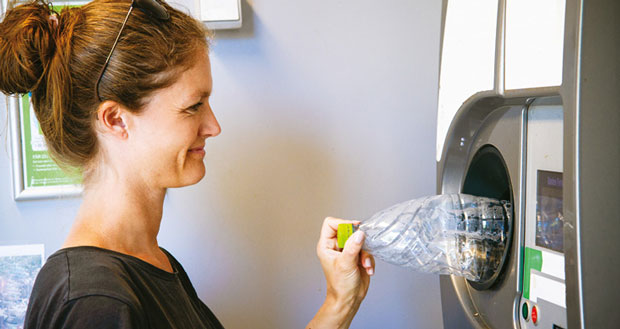 The introduction of a recycling vending machine can contribute to fostering a greener, more sustainable corporate environment. Emilia Jacobs, innovation lead at Connect Vending explains
The introduction of a recycling vending machine can contribute to fostering a greener, more sustainable corporate environment. Emilia Jacobs, innovation lead at Connect Vending explains
Corporate sustainability goes beyond meeting regulatory requirements; it involves actively seeking ways to minimise environmental impact, reduce waste, and contribute to a circular economy.
Integrating Reverse Vending Machines into the workplace aligns with this growing emphasis on corporate sustainability. Reverse Vending Machines, commonly known as RVMs, are automated devices designed to collect and recycle materials such as plastic bottles, containers, glass bottles, and aluminum cans.
Unlike traditional vending machines that dispense products, RVMs operate in a reverse manner – users deposit their recyclables into the machine, which then processes and stores the items for recycling. By providing employees with a convenient and accessible means to recycle, companies can demonstrate their commitment to environmental responsibility.
Here’s how a typical Reverse Vending Machine works:
- Deposit: Users insert their empty beverage containers into the machine.
- Identification: The machine identifies and verifies the type of material used.
- Compaction: Some RVMs compress or crush the deposited items to optimise storage space.
- Storage: Compacted materials are stored within the machine until it reaches capacity or is emptied by recycling operators.
- Incentives: In some cases, users receive an incentive for recycling, such as a discount coupon, a voucher, or a small amount of money.
- Recycling: The collected materials are transported to recycling facilities, where they undergo processing to be reused in the manufacturing of new products.
BENEFITS OF RVMS IN THE WORKPLACE
- Environmental Impact: RVMs play a crucial role in reducing the carbon footprint of an organisation. By encouraging recycling at the source, these machines help divert materials from landfills, conserving energy and resources required for traditional waste disposal methods.
- Employee Engagement: Promoting a sustainable workplace fosters a sense of responsibility among employees. RVMs offer a tangible and interactive way for staff to actively participate in the company’s environmental initiatives, enhancing overall engagement and morale.
- Cost Savings: Implementing RVMs can result in cost savings for organisations. By diverting recyclables from regular waste streams, companies may reduce waste disposal fees and potentially generate revenue through the sale of recycled materials.
POTENTIAL ISSUES WITH RVMS
While RVMs offer numerous benefits, it’s essential to address potential challenges to ensure their seamless integration into the workplace. Machine malfunctions, although infrequent, can disrupt the smooth operation of RVMs. To counter this, proactive measures, such as regular maintenance checks and prompt repairs, become paramount.
Contamination of recyclables is another consideration, underlining the importance of robust user education. Implementing clear guidelines on what materials are suitable for the RVMs helps mitigate the risk of contamination, fostering a more efficient recycling process.
Moreover, the challenge of limited space for machine placement necessitates strategic planning. Identifying optimal locations within the workplace ensures accessibility without compromising the flow of daily operations. Thoughtful placement contributes significantly to the user-friendly and effective utilisation of RVMs.
In navigating these challenges, a comprehensive approach that encompasses education, maintenance, and strategic placement will not only address potential issues but also enhance the overall effectiveness and sustainability impact of Reverse Vending Machines in the workplace.
HOW TO INTRODUCE A RVM INTO YOUR ORGANISATION
Implementing RVMs requires a strategic approach. Begin by conducting a waste audit to understand the types and volumes of recyclables generated within the organisation. Engage employees through awareness campaigns, highlighting the importance of recycling and explaining the use of RVMs.
Collaborate with waste management partners to establish a seamless collection and recycling process. Regularly monitor and evaluate the performance of RVMs, seeking feedback from employees to make continuous improvements.
Implementing a deposit return scheme in the workplace, powered by advanced technology, marks a significant leap towards sustainability. This forward-thinking initiative, specifically designed for drinks cans, showcases the integration of highly efficient processes.
The combination of a deposit return scheme alongside cutting-edge technology not only streamlines the collection and recycling journey but also significantly enhances overall recycling rates. This holistic approach exemplifies how embracing innovation can propel us toward a future where conscientious practices are seamlessly woven into the fabric of everyday operations, promoting a greener and more environmentally responsible workplace.
In summary, integrating RVMs into the workplace allows organisations to play an active role in environmental conservation, foster employee engagement, and enjoy the advantages of a more environmentally friendly and cost-effective operation. Embracing forward-thinking solutions such as RVMs signifies progress toward a more sustainable future.





